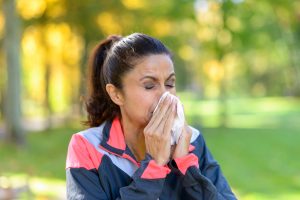6 Tips to Help You Exercise More Comfortably with Allergies

You know that exercising has a number of benefits but you have severe allergies. How can you find ways to make these two realities not contradict each other? The truth is that there are just six tips to follow to greatly increase how comfortable your next workout is – no matter what type of allergy you have.
- Know what your allergies are
- Choose the best time of day to exercise
- Exercise on days that are better than others
- Choose the correct workout
- Pay attention to what your body is telling you
- Plan ahead
First and foremost, you need to be sure that you truly understand your allergies. It’s all too common for a person to assume they’re allergic to one thing, only to find that they’re allergic to another. For example, if you have hay fever you may believe you’re allergic to something else entirely. The best way to know for sure is to work with Allergy, Asthma, and Immunology Medical Group for complete allergy testing.
If pollen is an issue for you, then it’s important to know that its highest count will be between 5 AM and 10 AM and then again from dusk until sundown. Plan your workouts either in the later morning, early afternoon, or late evening. You may also benefit from a saline rinse to get rid of pollen from your nasal cavities when you get home.
The key is to avoid exercise if it’s dry, warm, and / or windy. These are days with the highest pollen counts. If it’s too humid, that can be an issue as well. Why? Because high humidity can cause the air to feel heavy and can make it harder to breathe. Humidity also encourages the growth of mold, which is an allergy trigger for some folks.
There are some exercises that are more likely to trigger symptoms of allergies and asthma than others. For example, exercises that involve a lot of starting and stopping, such as tennis, can trigger more symptoms than exercises that don’t stop, such as running. For most people, swimming is a great way to build the longs, and biking works well too. Running on colder days may trigger symptoms as well. The good news though is that if you get the right treatment from Allergy, Asthma, and Immunology Medical Group, you can likely participate in any sport or activity.
If you’re taking medication and you still feel bad after exercising outdoors, then it may be that it’s not a good day for you to exercise outdoors. Listen to your body. Missing one workout is better than triggering an allergy attack.
Talk to us about your exercise goals and what you want to do in the future as well as what you’re doing today. For example, we may suggest that you begin allergy medications days or even weeks before a particular season begins. When you’re working closely with an allergist, you don’t have to wait for symptoms before taking action. Call Allergy, Asthma, and Immunology Medical Group at 805-658-9500 today to make an appointment.



